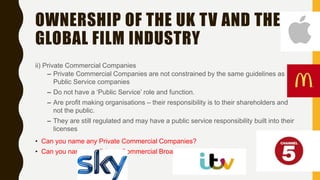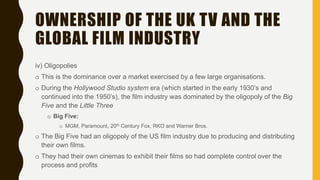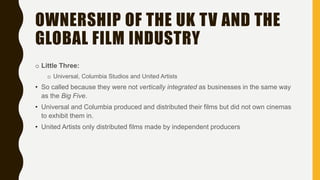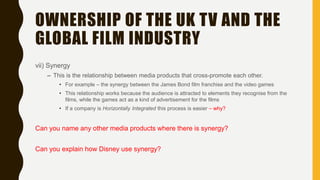Structure & ownership revision
- 1. UNIT 8: UNDERSTANDING THE TV AND FILM INDUSTRYR E V I S I O N G U I D E : O W N E R S H I P & F U N D I N G
- 2. FOR THIS TASK I’M PUTTING YOU IN GROUPS OF 3 WORKING ON L ARGE A1 SHEETS Y E S Y O U M I G H T B E W O R K I N G W I T H S O M E O N E Y O U D O N ’ T U S U A L LY W O R K W I T H – D O N ’ T PA N I C Y O U W I L L S U R V I V E !
- 3. WHAT YOU NEED TO KNOW FOR YOUR EXAM…. • Each media industry has several different types of organisations operating within it. • You need to understand the differences between types of organisations, the role and purpose of each, and be able to give examples of each type of organisation. • This includes public service broadcasters: State owned or commercial broadcasters & Private companies • You also need to understand the size and structure of media organisations and how this effects what they produce.
- 4. OWNERSHIP OF THE UK TV AND THE GLOBAL FILM INDUSTRY i) Public Service Companies (Public Service Broadcasters) Any radio or television station that is set up by the state rather than as a straightforward business. Usually, a public service broadcaster will be expected to do more than simply provide entertainment. The responsibilities of such an institution often include educational broadcasting, provision of news, exposing the audience to the arts and a range of music. In groups Can you name any UK Public Service Companies? Can you name any UK Public Service Broadcasters?
- 5. OWNERSHIP OF THE UK TV AND THE GLOBAL FILM INDUSTRY • The responsibilities of public service broadcasting are to serve the public interest. • They do this by promoting education and literacy • Stimulate creativity • Provide diverse content serving all the communities within the UK • Represent minority interests • Promote multiculturalism • Promote awareness of different cultures and viewpoints • Support technological advance • In groups can you give examples of any BBC programs and services that do each of these things you have 15 minutes
- 6. OWNERSHIP OF THE UK TV AND THE GLOBAL FILM INDUSTRY ii) Private Commercial Companies – Private Commercial Companies are not constrained by the same guidelines as Public Service companies – Do not have a ‘Public Service’ role and function. – Are profit making organisations – their responsibility is to their shareholders and not the public. – They are still regulated and may have a public service responsibility built into their licenses • Can you name any Private Commercial Companies? • Can you name any Private Commercial Broadcasters?
- 7. OWNERSHIP OF THE UK TV AND THE GLOBAL FILM INDUSTRY iii) Multinational Conglomerates Multinational - An organisation that which is not contained within a single country, but operates globally and has headquarters around the world. Can you think of any companies that are multinational? What is the advantage of being a multinational?
- 8. OWNERSHIP OF THE UK TV AND THE GLOBAL FILM INDUSTRY Conglomerate – A large business organisation that comprises a number of different companies, often linked by areas of interests or commodities, which when brought together have considerable strength and power. There are six corporations that own 90% of the key US/International companies. They are: Viacom Disney Time Warner General Electric Bertelsmann News Corporation You now have about 5 minutes to find 3 - 5 major media companies that they own
- 9. OWNERSHIP OF THE UK TV AND THE GLOBAL FILM INDUSTRY Viacom – Paramount, CBS, MTV Networks, Dreamworks, Channel 5, Nickelodeon Disney – ABC, Miramax, Pixar, Touchstone, Walt Disney Studios, Marvel Entertainment, Lucasfilm, ESPN Time Warner – Parent company of Warner Bros, HBO, CNN, AOL, DC Comics, Cartoon Network, New Line Cinema General Electric – NBC Universal, The Weather Channel, SyFy, Universal Studios, Working Title Films (UK Film Production company) Bertelsmann – Sony, BMG Music Publishing, RTL (European Media company), Random House Publishers News Corporation –
- 10. OWNERSHIP OF THE UK TV AND THE GLOBAL FILM INDUSTRY iv) Oligopolies o This is the dominance over a market exercised by a few large organisations. o During the Hollywood Studio system era (which started in the early 1930’s and continued into the 1950’s), the film industry was dominated by the oligopoly of the Big Five and the Little Three o Big Five: o MGM, Paramount, 20th Century Fox, RKO and Warner Bros. o The Big Five had an oligopoly of the US film industry due to producing and distributing their own films. o They had their own cinemas to exhibit their films so had complete control over the process and profits
- 11. OWNERSHIP OF THE UK TV AND THE GLOBAL FILM INDUSTRY o Little Three: o Universal, Columbia Studios and United Artists • So called because they were not vertically integrated as businesses in the same way as the Big Five. • Universal and Columbia produced and distributed their films but did not own cinemas to exhibit them in. • United Artists only distributed films made by independent producers
- 12. A) OWNERSHIP OF THE UK TV AND THE GLOBAL FILM INDUSTRY v) Vertical Integration – The merger or takeover of companies operating at different stages of the production/distribution process. – Total vertical integration gives a company control of a product from raw materials to distribution. • E.g. In media Industries, the takeover by newspaper owner of the distribution service and retail outlets such as newsagents would be vertical integration. –In groups again- –Can you explain why Apple is known described as vertically integrated company? –Can you think of any media companies that are Vertically Integrated?
- 13. OWNERSHIP OF THE UK TV AND THE GLOBAL FILM INDUSTRY vi) Horizontal Integration – Where a media company owns several businesses in the same sector of the industry. • E.g. Trinity Mirror newspapers own both the Sunday Mirror and The People What are the benefits of this system for a company? You have 15 minutes to list the differences between horizontal and vertical integration.
- 14. OWNERSHIP OF THE UK TV AND THE GLOBAL FILM INDUSTRY vii) Synergy – This is the relationship between media products that cross-promote each other. • For example – the synergy between the James Bond film franchise and the video games • This relationship works because the audience is attracted to elements they recognise from the films, while the games act as a kind of advertisement for the films • If a company is Horizontally Integrated this process is easier – why? Can you name any other media products where there is synergy? Can you explain how Disney use synergy?
- 15. OWNERSHIP OF THE UK TV AND THE GLOBAL FILM INDUSTRY viii) Cross Media Ownership – The ownership of several companies tat produce different media In groups again – you have 10 minutes - Can you think of any companies that have Cross Media Ownership? List the positives and negatives of this system?
- 16. WHAT YOU NEED TO KNOW FOR YOUR EXAM PART 2…. • The media industry has several different ways of being funded You need to understand the purpose of government support being provided to publicly funded media organisations and how and why this can influence products • Part 2: Types of funding • Public & Private funding and the advantages and disadvantages of this • Regulatory organisations
- 17. FUNDING • BBC Income What is the main way the BBC make money? – The TV License fee How much is the TV License fee? – £145.50 per year, per household – The BBC makes £3.735 billion per year How else does the BBC make money? – Merchandising – Selling books, DVDs, CDs and magazines – Selling programmes to other companies/networks. – In groups list some examples of this
- 18. FUNDING • ITV Income – Private broadcasters, such as ITV, must make healthy profits in order to continue broadcasting as they do not receive revenue from the tax payer like the BBC does. What is the main way ITV makes money? – Advertising revenue – Sponsorship – Reality TV – e.g. viewer calls – Sale of programmes/productions – Merchandising In groups you have 5 minutes to find:- a ITV program with sponsorship, A ITV program that makes money through viewer calls, an ITV program that is sold to another channel and an ITV program with merchandising
- 19. FUNDING • Channel 4 Income – Channel 4 is a Public Service Broadcaster, although, unlike the BBC, Channel 4 receives no public funding. It is funded entirely by its own commercial activities. So, how does Channel 4 make money? – Advertising revenue – Sponsorship – Reality TV – e.g. viewer calls – Sale of programmes/productions – Merchandising In groups you have 5 minutes to find:- a C4 program with sponsorship, A C4 program that makes money through viewer calls, a C4 program that is sold to another channel and a C4 program with merchandising.
- 20. FUNDING • BskyB Funding What is the main income for BskyB? – Monthly Subscription fees – £1.33bn last year from 10.24 million pay TV subscribers How else do BskyB make money? – Broadband subscriptions – 4.9 million households – On-demand downloads – Sky Store – Advertisements – Sponsorships – Merchandising – Sale of programmes/productions BskyB made a total of £7.235bn last year In groups List as many channels as you can that BskyB own




















